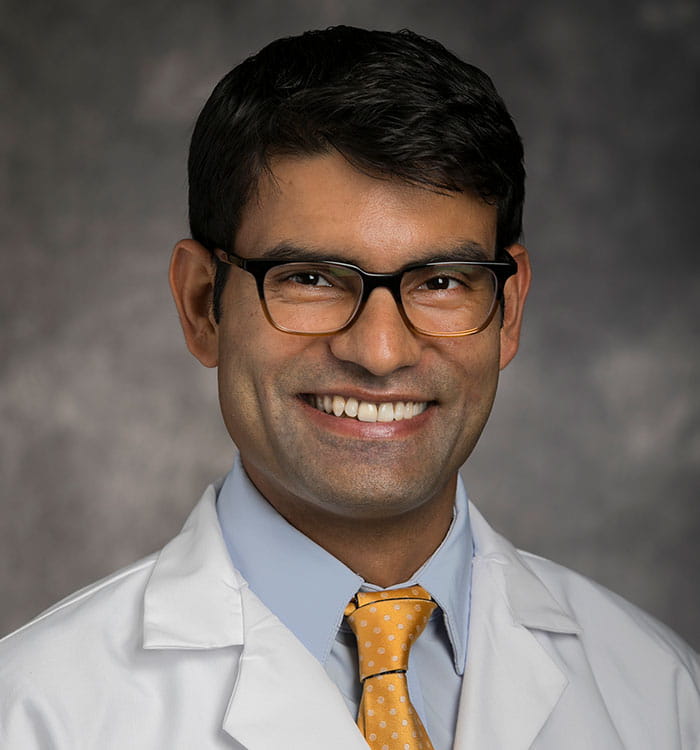UH Grows Groundbreaking LGBTQ and Gender Care Services
January 26, 2021
Program addresses physical, mental, social and spiritual wellbeing of patients
Innovations in Urology | Winter 2021
Health disparities experienced by the LGBTQ community are being addressed at University Hospitals through a new LGBTQ and Gender Care program
 Shubham Gupta, MD.
Shubham Gupta, MD.In less than a year, the program has supported 50 patients with gender dysphoria and performed 20 gender affirmation surgeries in the second half of 2020, including the first free flap phalloplasty in the state of Ohio. That number is expected to increase threefold in 2021.
“Our goal is to serve all of our patients’ needs — from medical to hormonal to surgical,” says Shubham Gupta, MD, director of the Surgical Gender Affirmation Program at the University Hospitals Urology Institute and Division Chief of Reconstructive Urology at University Hospitals Cleveland Medical Center. “We have a vast network of physicians across the UH system under the umbrella of LGBTQ and Gender Care services.”
Every transgender person travels their own unique journey, so this program aims to meet patients wherever they are in their journey to help them achieve their goals. Whether a patient is taking cross-gender hormones and considering gender affirmation surgery, or early in their transition and unsure how to navigate the medical landscape, UH can connect them with the appropriate professionals.
The LGBTQ and Gender Care program provides the physical, mental, social and spiritual wellbeing for this important and growing population, drawing from work in medicine, behavioral and mental health, public health, community health, social work, research and education.
INNOVATING TRANSGENDER CARE
Many transgender individuals find that the medical community alone does not understand their unique needs. The UH program addresses that in close collaboration with community partners, and aims to break down those barriers.
 UH patient Bobby Hillier, age 20.
UH patient Bobby Hillier, age 20.
 UH patient, Bobby Hillier, age 12.
UH patient, Bobby Hillier, age 12.There are more than 40,000 transgender individuals just in Ohio, one such individual is Bobby Hillier, a Toledo resident who underwent female-to-male gender affirmation surgery at UH. There are also many patients who seek transgender care at UH from other states.
“Bobby is an example of how we are improving lives for patients and their families,” Dr. Gupta says. “He knew at an early age what he wanted to be [a man] and had the support structure to complete his transition.”
Without the UH program, Dr. Gupta says, Bobby would have probably saved for years until he was able to afford gender affirmation surgery elsewhere.
“For every Bobby, there are 10 others who don’t have the tools or support to make this transition. These individuals live in a constant state of dysphoria, and often experience mental health problems, loss of physical production and social engagement.”
IT TAKES A VILLAGE
Because gender affirmation surgeries are complex, multi-step operations with high risks of complications and lengthy recoveries, UH continues to innovate to improve patient care and to ferret out the nuances of each surgical step.
UH has been the only center in Ohio offering male-to-female and female-to-male gender affirmation surgery, performing more surgeries than any other U.S. academic health center in Ohio and several neighboring states. These complex surgeries can require multidisciplinary teams, including urology, plastic surgery, OBN/GYN and ENT, as well as fertility experts.
For example, a phalloplasty requires three separate operations over about 18 months, and each operation has multiple sub-operations. Once a patient decides to undergo surgery, a patient navigator guides them through the process. But the completion of surgery is not the end of care.
UH continues to address the unique challenges of transgender individuals, including side effects of gender hormone therapy (for example, changes in bone density or metabolic function) and cancer screenings in organs that remain after gender affirmation surgery. Sexual function after gender affirmation surgery continues to be mapped with greater precision at UH. For example, women should be screened for prostate cancer.
Dr. Rachel Pope, a trained gynecologist, is the new division chief of female sexual health, and she brings new insights into evaluation and optimization of sexual function using innovative treatments to UH’s LGBTQ patients. Additionally, mental health experts help patients navigate the emotional aspects of transition and an endocrinologist administers hormone therapy.
“We have also liaised with physical therapy and integrative medicine,” Dr. Gupta says. “If our patient needs ancillary help before or after surgery, such as acupuncture, acupressure or meditation that could enhance their recovery, we can offer that as well.”
Working with other medical professionals around the world and training the next generation of medical leaders in this field is critical. “We are just getting started,” says Dr. Gupta. “We must be comprehensive, and we must be evidence based. Where the evidence is not available, we are committed to getting it. We have to continually evaluate what works and what doesn’t.”


